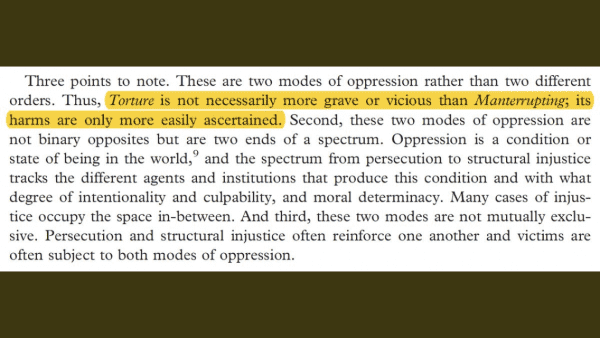Torture, Manterrupting, What’s The Difference?

A reader writes from inside the academy:
There continues to be plenty of good work going on in academic philosophy, but the future looks bleak. This is the sort of garbage this is being published in peer-reviewed journals: torture and “manterrupting” are basically the same.
Ashwini Vasanthakumar, “Epistemic Privilege and Victims’ Duties to Resist Their Oppression” Journal of Applied Philosophy 2016, p. 4.

You can have your fingernails pulled out with pliers by an agent of the state, or you can have a male interrupt you. Pick your poison; they’re equally deadly, according to Prof. Vasanthakumar of King’s College, London.
The reader continues:
I look around and I see a lot of very bright young men, mostly white but asian too, who have stellar credentials: a PhD from a top university, publications in top journals, solid teaching background and these men will send out 100+ applications or even hundreds and not land a single interview. Yet, many women with no publications are hired for these very spots. Obviously there is a quota. Seeing extreme feminist nonsense like this published in a decent journal, you have to wonder if the fix is in. White men need not apply. The future of academic philosophy may belong to the SJWs.
So, what’s going on with the academic theologians? Well, at the Jesuit-run College of the Holy Cross, things are getting mighty queer:
A little over ten years ago, on the occasion of their 50th Reunion, alumni of the College endowed the Class of 1956 Chair of New Testament Studies, a distinguished professorship associated with the Religious Studies department.1 In the autumn of 2013, the College appointed professor Tat-Siong Benny Liew to fill this position. Professor Tat-siong Benny Liew received bachelor’s and master’s degrees from Olivet Nazarene University and completed his doctorate at Vanderbilt University. Prior to his appointment at Holy Cross, Professor Liew had been Professor of New Testament at the Pacific School of Theology, and before that taught at Chicago Theological Seminary. According to the Department of Religious Studies webpage, his fields of specialty include “synoptic gospels, gospel of John, cultural and racial interpretations and receptions of the Bible, apocalypticism, and Asian American history and literature.”
Professor Liew’s numerous publications reveal an unconventional approach to gender, sexuality, and race in the biblical texts. The 2004 article “Mistaken Identities but Model Faith: Rereading the Centurion, the Chap, and the Christ in Matthew 8:5-13,” provides a representative example. Professor Liew and his co-author, Theodore Jennings, argue that Matthew 8:5-13, the story of the centurion who goes to Jesus to ask for healing for his servant, ought to be interpreted in terms of a sexual relationship. Matthew’s account, runs the argument, does not concern a centurion and his servant, but a centurion and his lover/slave. “The centurion’s rhetoric about not being ‘worthy’ of a house visit by Jesus (8:8) may be the centurion’s way of avoiding an anticipated ‘usurpation’ of his current boylove on the part of his new patron [Jesus],” they assert. Furthermore, “The way Matthew’s Jesus seems to affirm the centurion’s pederastic relationship with his παῖς, we contend, may also be consistent with Matthew’s affirmation of many sexual dissidents in her Gospel.”
More:
Professor Liew’s contribution to this volume, a chapter entitled “Queering Closets and Perverting Desires: Cross-Examining John’s Engendering and Transgendering Word across Different Worlds,” demonstrates the centrality of sex and gender to his way of thinking about the New Testament. In the chapter, Professor Liew explains that he believes Christ could be considered a “drag king” or cross-dresser. “If one follows the trajectory of the Wisdom/Word or Sophia/Jesus (con)figuration, what we have in John’s Jesus is not only a “king of Israel” (1:49; 12:13– 15) or “king of the Ioudaioi” (18:33, 39; 19:3, 14– 15, 19– 22), but also a drag king (6:15; 18:37; 19:12),” he claims.5 He later argues that “[Christ] ends up appearing as a drag-kingly bride in his passion.”6
Professor Liew continues:
In addition, we find Jesus disrobing and rerobing in the episode that marks Jesus’ focus on the disciples with the coming of his ‘hour’ (13:3– 5, 12). This disrobing, as [Colleen] Conway points out, does not disclose anything about Jesus’ anatomy. Instead, it describes Jesus washing his disciples’ feet. As more than one commentator has pointed out, foot-washing was generally only done by Jewish women or non-Jewish slaves. 12 John is clear that Jesus is an Ioudaios (4:9, 22; 18:33– 35; 19:40); what John is less clear about is whether Jesus is a biological male. Like a literary striptease, this episode is suggestive, even seductive; it shows and withholds at the same time.
If you can stand it, read on to learn about the distinguished professor’s take on the Passion of the Christ. He calls it a pageant of sadomasochism in which Jesus is incestuously sexually involved with God the Father.
Have a good Holy Week at the College of the Holy Cross, kids! No doubt that annual $67,000 tuition, room, and board fee is well spent by your Catholic parents. Be sure to tell them about the fun new things you’re learning in Prof. Liew’s theology classes.
H/T to Matthew Schmitz:
If you want to understand what @MassimoFaggioli has called “the estrangement between academic theology and the institutional Church,” read this. https://t.co/qo9044Rowl
— Matthew Schmitz (@matthewschmitz) March 27, 2018

Subscribe for as little as $5/mo to start commenting on Rod’s blog.